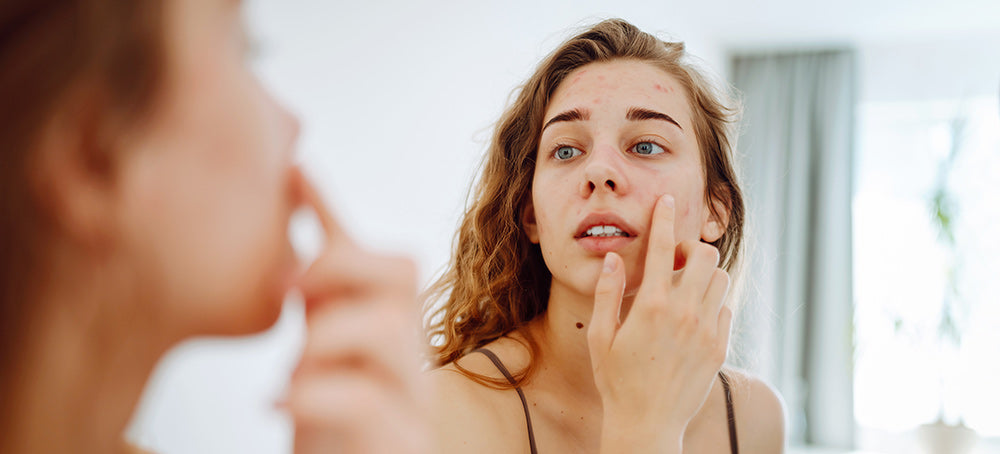Acne is more than just a pesky skin issue; it's a condition that can affect confidence and overall well-being. Whether you're dealing with occasional breakouts or more persistent problems, learning how to prevent acne is essential.
A consistent skincare routine plays a crucial role in keeping acne at bay and choosing the right products can make all the difference. In this post, we'll share 14 practical tips to help you reduce pimples and maintain clearer skin.
Understanding Acne
Acne, also known as acne vulgaris, is a common skin condition that occurs when hair follicles become clogged with oil and dead skin cells. This can lead to the formation of pimples, blackheads and whiteheads. Several factors contribute to acne, including hormonal changes, stress, diet and the use of certain skincare products. It's important to understand that acne is not just a surface issue.
Treating acne effectively requires targeting its root causes, such as excess oil production, clogged pores and inflammation. By addressing these factors, you can help prevent acne and reduce the risk of acne scars.
Allmedic’s Top Tips For How To Prevent Acne
1. Keep Your Face Clean
One of the most important steps in preventing acne is keeping your face clean. Use a gentle cleanser twice daily to remove dirt, excess oil and other impurities that can clog pores.2. Use Non-Comedogenic Products
Choose skincare and makeup products labelled as non-comedogenic, meaning they won’t clog pores. This is especially crucial for acne-prone skin, as clogged pores are a primary cause of acne vulgaris.3. Avoid Over-Cleansing
While it's essential to keep your skin clean, over-cleansing can strip away natural oils, leading to dryness and irritation, which can worsen acne. Stick to cleansing your face no more than twice a day.4. Exfoliate Regularly
Exfoliating helps remove dead skin cells that can clog pores and lead to acne formation. Incorporate a gentle exfoliator into your routine 2-3 times a week, focusing on areas prone to developing acne.5. Don’t Skip the Moisturiser
Even if you have oily skin, it's important to moisturise daily. Use a non-comedogenic, oil-free moisturiser to keep your skin hydrated without contributing to clogged pores.

Discover how to prevent acne effectively by incorporating a balanced diet and proper skincare into your daily routine.
6. Use Targeted Acne Treatments
Products containing salicylic acid and Glycolic Acid are effective in treating acne. These ingredients work by exfoliating the pores and skin surface.7. Keep Your Hair Clean
Oily hair can contribute to acne breakouts by transferring oils to your skin, especially around the forehead and hairline. Wash your hair regularly and keep it off your face to prevent acne formation.8. Avoid Touching Your Face
Your hands come into contact with countless bacteria and oils throughout the day. Touching your face can transfer these to your skin, potentially triggering acne breakouts.9. Be Mindful of Your Diet
Diet can play a role in skin health. High-glycemic foods and dairy have been linked to increased acne formation. Focus on a balanced diet rich in fruits, vegetables and lean proteins to help control acne.10. Manage Stress
Stress can trigger acne flare-ups, particularly in cases of hormonal acne. Engage in stress-reducing activities like yoga, meditation, or exercise to keep both your mind and skin healthy.

Knowing how to help prevent acne can help you maintain clear, healthy skin and reduce the chances of breakouts.
11. Stay Hydrated
Drinking plenty of water helps keep your skin hydrated and flushes out toxins, which can reduce the risk of acne vulgaris. Aim for at least 8 glasses of water a day to support overall skin health.12. Get Enough Sleep
Lack of sleep can affect your skin’s ability to repair itself, potentially leading to more acne breakouts. Aim for 7-9 hours of quality sleep each night to support your skin’s natural healing processes.13. Avoid Picking at Pimples
While it may be tempting, picking or popping pimples can worsen acne and lead to acne scars. Instead, use an acne treatment that helps to reduce inflammation and treat acne without damaging the skin.14. See a Dermatologist for Severe Acne
If you’re struggling with severe acne that doesn’t respond to over-the-counter treatments, it’s time to consult a dermatologist. They can provide stronger acne treatments and guide you on how to manage your condition effectively.Daily Skincare Routine to Prevent Acne
To maintain clear skin, it’s essential to follow a consistent skincare routine that targets acne. Here’s a simple yet effective daily routine using Allmedic products:- Cleanse: Begin by washing your face with Allmedic Acne Clear Cleanser to remove dirt, oil and impurities.
- Exfoliate: Use Allmedic Acne Clear Scrub 2-3 times a week to gently exfoliate and prevent clogged pores.
- Treat: Apply Allmedic Acne Clear Night Exfoliating Lotion to target and reduce acne breakouts.
FAQs
How can I prevent breakouts while wearing makeup?
To prevent breakouts, choose non-comedogenic makeup products that won’t clog pores. Ensure you remove all makeup thoroughly at the end of the day using a gentle cleanser.What should I do if I get the urge to pop pimples?
Avoid the temptation to pop pimples as it can lead to scarring and spread acne-causing bacteria. Instead, use a targeted acne treatment to help heal the blemish.Can a healthy diet help reduce acne?
Yes, maintaining a healthy diet rich in fruits, vegetables and lean proteins can support skin health and reduce the likelihood of breakouts.How long does it take to get acne treated?
The time it takes to get acne treated varies depending on the severity of the condition and the treatments used. Consistency with your skincare routine and following your dermatologist's advice is key to seeing results.
This information is not intended to be used for diagnosis or treatment. It is aimed at presenting a perspective only and is not a substitute for a prescription. Anyone experiencing a medical condition should consult their doctor.


